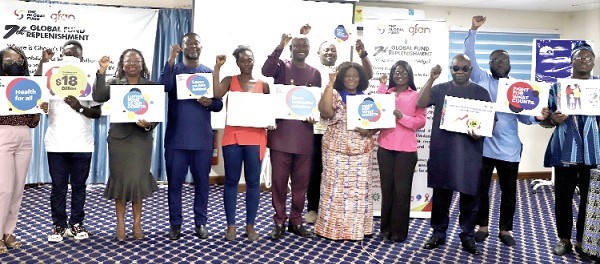
CSOs entreat government to support Global Fund agenda
Some civil society organisations (CSOs) have entreated the government to support the seventh Global Fund Replenishment Agenda to help fight HIV/AIDS, tuberculosis (TB), malaria and emerging diseases in the country.
The fund is expected to mobilise $18 billion to save about 20 million lives globally.
Advertisement
Part of the money will be used to strengthen the country's health system in preparedness against future pandemics and emerging diseases, such as the Monkey pox.
It is in the light of this that the CSOs has urged the government to make a commitment of at least $2 million to support the cause.
The eight CSOs who made the appeal are Hope for Future Generations (HFFG), the Ghana HIV/AIDS Network (GHANET), the Stop TB Partnership and Youth Health Advocates Ghana.
The rest are Rural Watch, the National Association of Persons Living with HIV (NAP+Ghana), the TB Voice Network and the Malaria Coalition.
They were speaking at the seventh Global Fund Replenishment CSOs media engagement in Accra yesterday.
It was organised by the HFFG, with support from the Global Fund Advocacy Network (GFAN).
Commitment
A board member of Developing Non-governmental organisation Delegation to the Global Fund, Cecilia Senoo, said as a beneficiary of the fund, the country needed to make its pledge at its seventh conference in New York by September 19, 2022 to redeem its image.
“It’s sad to note that Ghana did not even confirm and redeem its pledge of one million dollars during the sixth conference,” she said.
Ms Senoo, who is also the Executive Director of HFFG, said such a pledge would ultimately help “build resilient and sustainable systems for health and strengthen pandemic preparedness".
According to her, Ghana was the first recipient of the Global Fund, championed by a former UN Secretary-General, Kofi Annan, in 2002.
She said as of September 2022, the fund had invested about $1.3 billion to strengthen Ghana's health systems and support the national HIV, TB, and malaria programmes.
An additional $87 million was approved under the COVID-19 Response Mechanism (C19RM) between 2020 and 2022, which had recently been invested to support a robust national COVID-19 response initiative and improve the country's core health systems, she said.
She said over the past 20 years, the fund had invested $53 billion to save 44 million lives globally, and that annual death tolls from the three diseases — HIV/AIDS, TB and malaria — had also been reduced by 40 per cent in beneficiary countries.
Overview
Giving an overview of the fund’s support to Ghana, the President of GHANET, Ernest Amoabeng Ortsin, said over the past 20 years, anti-retroviral therapy (ART) coverage had increased to over 70 per cent, reflecting the government's commitment to reach 350,000 people living with HIV in the country.
Furthermore, he said, AIDS-related deaths decreased by 35 per cent between 2010 and 2021, while the transmission of HIV from mother to child also decreased by 28 per cent between 2015 and 2020.
Mr Ortsin also said TB-related deaths decreased by 12 per cent between 2010 and 2021, while treatment success rate increased from 60 per cent in 2002 to above 80 per cent over the last 10 years.
Malaria-related deaths also decreased more than 85 per cent from 2,799 in 2012 to 308 in 2020.
Additionally, he said, more than 79 per cent of the population had access to long-lasting insecticide nets (LLINs), while there were 170,000 COVID-19 reported cases, with more than a million antigen rapid diagnostic tests (RDTs) procured during the pandemic.
The President of the Malaria Coalition and NAP+Ghana, Professor Ato Duncan, and Elsie Ayeh were among the speakers.



